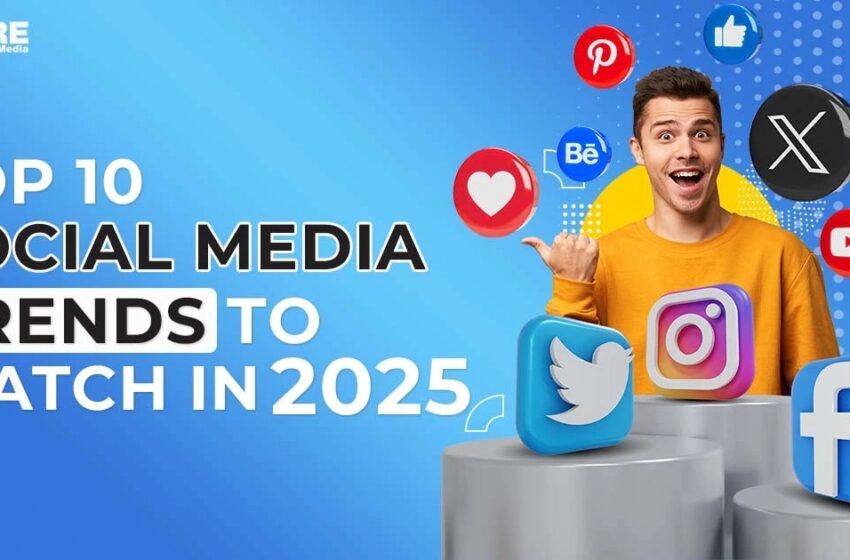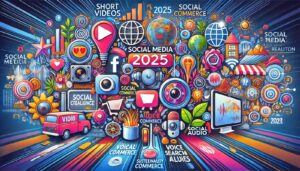Grok 4 Launched : xAI’s Most Advanced AI for Coding, Reasoning & More
Social Media Evolution 2025: The Next Big Trends in Social Media Platforms and Usage

Social Media
Social media has come a long way since the early days of Friendster and MySpace. What started as a way to connect with friends and family has now evolved into a massive digital ecosystem that influences every aspect of our lives, from entertainment and business to politics and mental health. As technology continues to advance, the social media landscape is also rapidly changing. What will the next big trends be? Let’s explore the future of social media and the trends that will define the next generation of digital interactions.

The Rise of AI-Powered Social Media
Artificial intelligence (AI) is already playing a crucial role in social media, from content recommendation algorithms to chatbots. However, the next phase of AI-driven social media will see even more personalized and immersive experiences. AI-generated content (AIGC), such as text, images, and videos, will become mainstream, allowing users to create professional-quality content effortlessly. Platforms will also use AI for enhanced moderation, reducing harmful content and misinformation while improving engagement.
Key Impacts:
- More sophisticated AI-driven chatbots for customer service and interaction.
- AI-powered content creation tools making high-quality posts accessible to everyone.
- Advanced moderation techniques to curb fake news, hate speech, and cyberbullying.

Decentralization and Blockchain-Based Social Media
With increasing concerns about data privacy, censorship, and platform monopolies, decentralized social media is gaining traction. Blockchain-based platforms, such as Mastodon and Bluesky, offer users more control over their data and content, reducing reliance on big tech corporations.
Key Impacts:
- Users will have more ownership over their content and data.
- A reduction in censorship concerns as platforms operate on decentralized networks.
- More opportunities for monetization through token-based reward systems and NFTs.

The Growth of the Metaverse and Virtual Social Spaces
The concept of the metaverse is no longer just a futuristic idea; it is becoming a reality. Platforms like Meta (formerly Facebook), Decentraland, and Roblox are investing heavily in virtual social spaces where users can interact through avatars, attend virtual events, and even conduct business.
Key Impacts:
- Increased adoption of VR and AR technologies for social interactions.
- More immersive online communities, replacing traditional text-based social networks.
- Brands leveraging the metaverse for marketing, customer engagement, and e-commerce.

Short-Form Video Dominance
Platforms like TikTok, Instagram Reels, and YouTube Shorts have revolutionized content consumption. Short-form video content is engaging, highly shareable, and preferred by younger audiences. As attention spans continue to decrease, this trend will only grow.
Key Impacts:
- More brands and influencers focusing on bite-sized, engaging content.
- AI-enhanced video editing tools making content creation easier.
- Increased competition among platforms to dominate the short-video space.

Social Commerce: Shopping Directly from Social Media
Social media is no longer just about connecting with people; it is now a marketplace. Platforms like Instagram, Facebook, and TikTok are integrating shopping features, allowing users to discover and purchase products without leaving the app.
Key Impacts:
- Increased influencer-driven shopping experiences.
- More brands using AR try-on features for virtual product testing.
- Expansion of live shopping events where influencers sell products in real-time.

Privacy and Digital Well-Being
With rising concerns about data security and mental health, users are becoming more cautious about their online activities. Platforms are being pressured to introduce better privacy controls, reduce algorithmic addiction, and promote healthier digital habits.
Key Impacts:
- More platforms adopting “privacy-first” approaches, limiting data tracking.
- Increased demand for digital detox tools and well-being features.
- Stricter regulations around data collection and user privacy.

Audio-First Social Media
The success of Clubhouse and Twitter Spaces has demonstrated that audio-based social networking is here to stay. Podcasts, live audio chats, and voice-driven interactions are becoming popular alternatives to text and video content.
Key Impacts:
- More platforms integrating live audio rooms for discussions and events.
- Increased use of AI-powered voice assistants for personalized interactions.
- Growth of niche communities centered around audio-based content.

Niche and Community-Driven Platforms
As users become frustrated with mainstream social media platforms, there is a shift toward smaller, niche communities. Platforms like Discord and Reddit are thriving because they offer highly engaged, topic-specific discussions rather than algorithm-driven content feeds.
Key Impacts:
- Growth of micro-communities where users interact based on shared interests.
- Less reliance on ad-driven models, with more focus on user-funded content.
- Increased adoption of subscription-based models for exclusive content.

The Evolution of Influencer Marketing
Influencer marketing is evolving beyond sponsored posts. Brands are now focusing on long-term partnerships, co-branded products, and micro-influencers who have highly engaged niche audiences.
Key Impacts:
- Shift from mega-influencers to micro and nano-influencers.
- More collaborations between brands and influencers on product development.
- AI-driven influencer analytics for better campaign performance tracking.

Gamification and Interactive Content
Gamification elements, such as badges, challenges, and interactive polls, are making social media more engaging. Platforms are incorporating interactive content to keep users hooked and encourage more participation.
Key Impacts:
- Increased use of interactive filters, quizzes, and polls to boost engagement.
- Brands leveraging gamified experiences for marketing campaigns.
- Greater emphasis on rewards and incentives to encourage user activity.

Conclusion
Social media is evolving at an unprecedented pace, driven by advancements in AI, blockchain, and immersive technologies. The next generation of social media platforms will be more personalized, decentralized, and immersive, offering users greater control and engagement. Brands, content creators, and marketers must stay ahead of these trends to remain relevant in the ever-changing digital landscape. As we move forward, one thing is certain: social media will continue to shape how we connect, communicate, and consume content in ways we never imagined.
ALSO READ THIS: ChatGPT: The Ultimate AI Assistant for Success and 24/7 Smart Companion for Innovation


